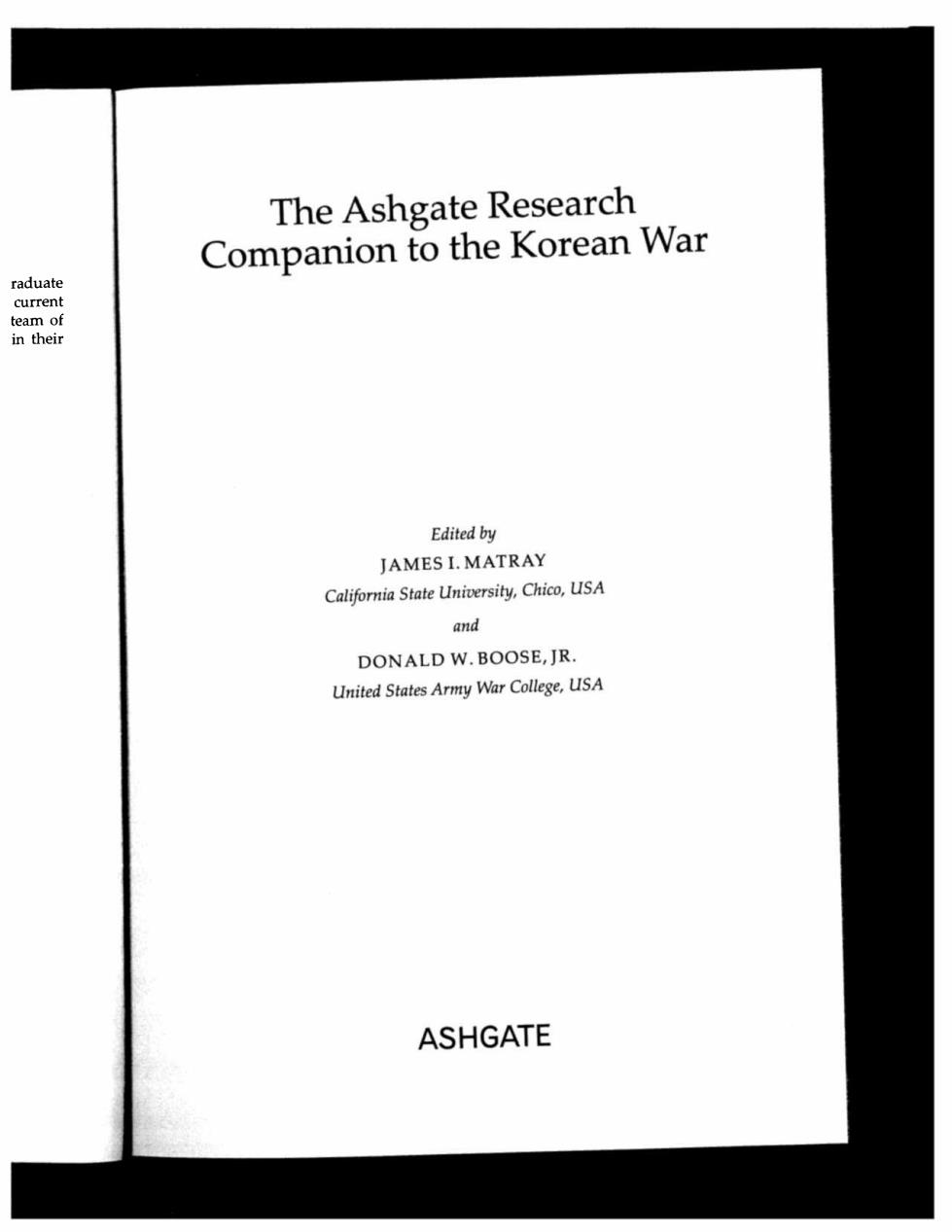
The Ashgate Research Companion to the Korean War raduate current team of in their Edited by JAMES I.MATRAY California State University,Chico,USA and DONALD W.BOOSE,JR. United States Army War College,USA ASHGATE
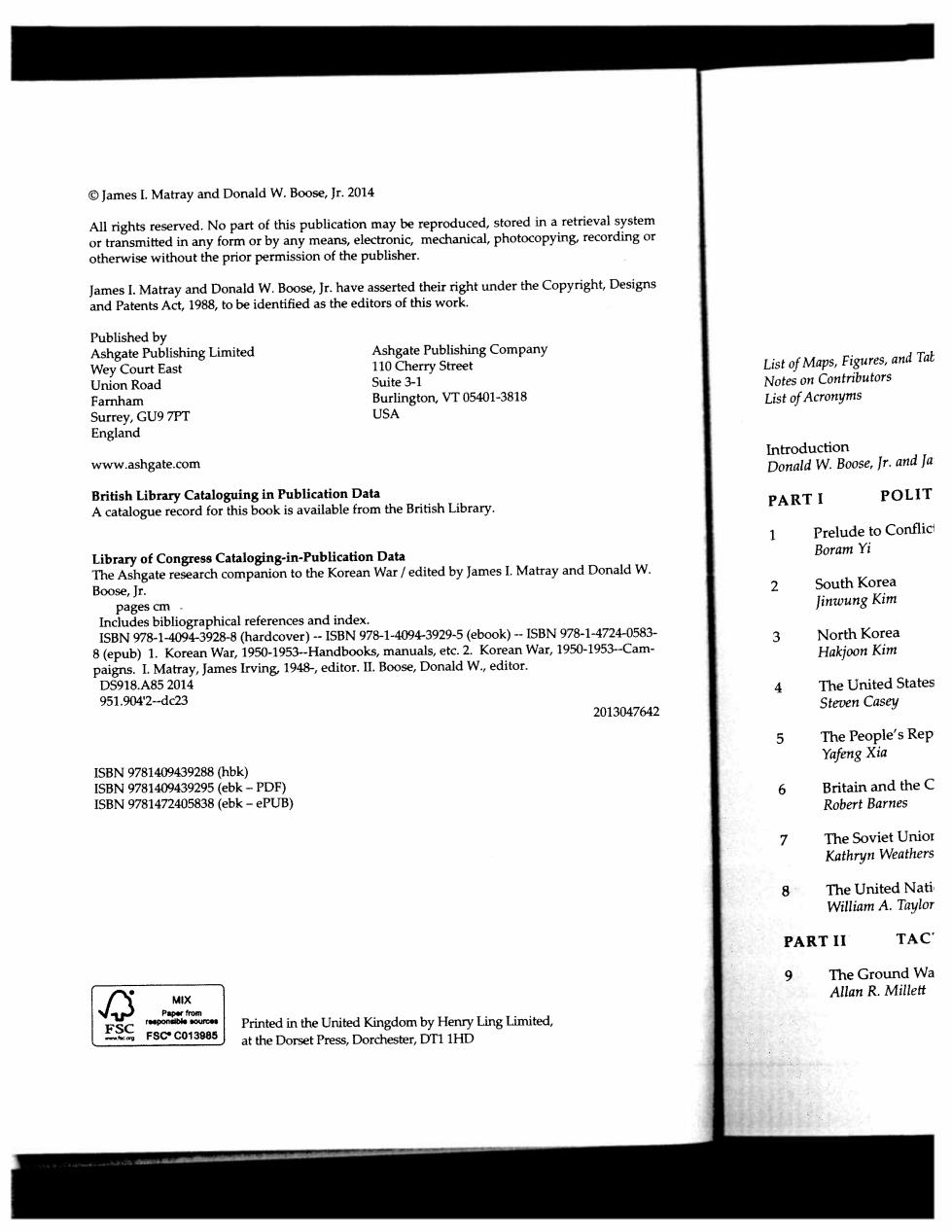
@James I.Matray and Donald W.Boose,Jr.2014 All rights reserved.No part of this publication may be reproduced,stored in a retrieval system or transmitted in any form or by any means,electronic,mechanical,photocopying,recording or otherwise without the prior permission of the publisher. James I.Matray and Donald W.Boose,Jr.have asserted their right under the Copyright,Designs and Patents Act,1988,to be identified as the editors of this work. Published by Ashgate Publishing Limited Ashgate Publishing Company Wey Court East 110 Cherry Street List of Maps,Figures,and Tat Union Road Suite 3-1 Notes on Contributors Farnham Burlington,VT05401-3818 List of Acronyms Surrey,GU9 7PT USA England Introduction www.ashgate.com Donald W.Boose,Jr.and Ja British Library Cataloguing in Publication Data A catalogue record for this book is available from the British Library. PARTI POLIT 1 Prelude to Conflict Library of Congress Cataloging-in-Publication Data Boram Yi The Ashgate research companion to the Korean War/edited by James I.Matray and Donald W. Boose,Jr. 2 South Korea pages cm Jinwung Kim Includes bibliographical references and index. ISBN978-1-40943928-8(hardcover)-ISBN978-1-4094-3929-5(ebook)-ISBN978-1-4724-0583- 3 North Korea 8(epub)1.Korean War,1950-1953--Handbooks,manuals,etc.2.Korean War,1950-1953--Cam- Hakjoon Kim paigns.I.Matray,James Irving,1948-,editor.II.Boose,Donald W.,editor. D5918.A852014 The United States 951.9042-dc23 Steven Casey 2013047642 The People's Rep Yafeng Xia ISBN9781409439288(hbk) ISBN9781409439295(ebk-PDF) 6 Britain and the C ISBN 9781472405838(ebk-ePUB) Robert Barnes 7 The Soviet Unior Kathryn Weathers 8 The United Nati. William A.Taylor PART II TAC' The Ground Wa MIX Allan R.Millett FSC npcn Printed in the United Kingdom by Henry Ling Limited, FSCC013985 at the Dorset Press,Dorchester,DT1 1HD
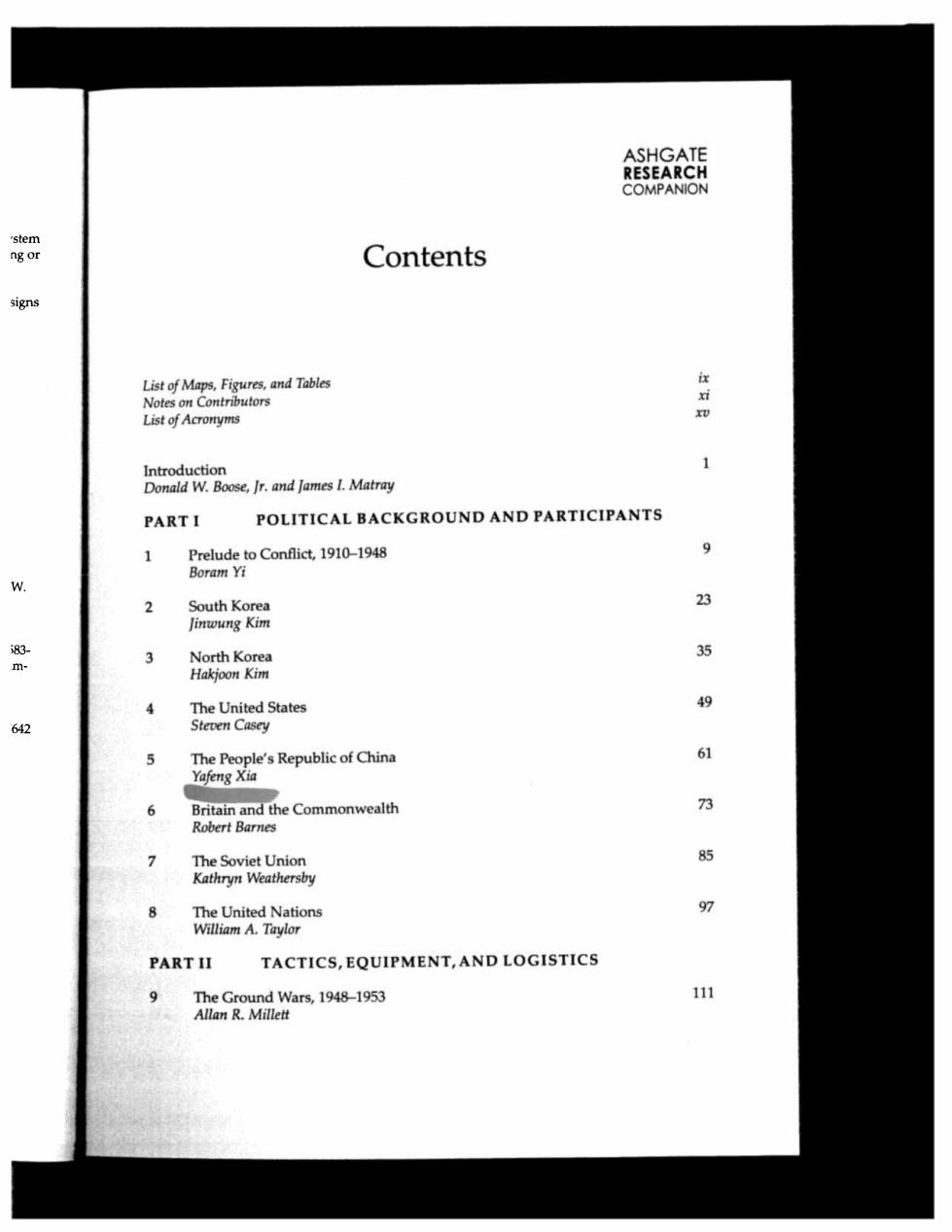
ASHGATE RESEARCH COMPANION 'stem ng or Contents signs List of Maps,Figures,and Tables 年 Notes on Contributors List of Acronyms Introduction Donald W.Boose,Jr.and James I.Matray PARTI POLITICAL BACKGROUND AND PARTICIPANTS 1 Prelude to Conflict,1910-1948 9 Boram Yi w. 2 South Korea 23 Jinwung Kim 83- North Korea 35 m Hakjoon Kim The United States 49 642 Steven Casey The People's Republic of China 61 Yafeng Xia 6 Britain and the Commonwealth 73 Robert Barnes 7 The Soviet Union 85 Kathryn Weathersby 8 The United Nations 97 William A.Taylor PART II TACTICS,EQUIPMENT,AND LOGISTICS 9 The Ground Wars,1948-1953 111 Allan R.Millett
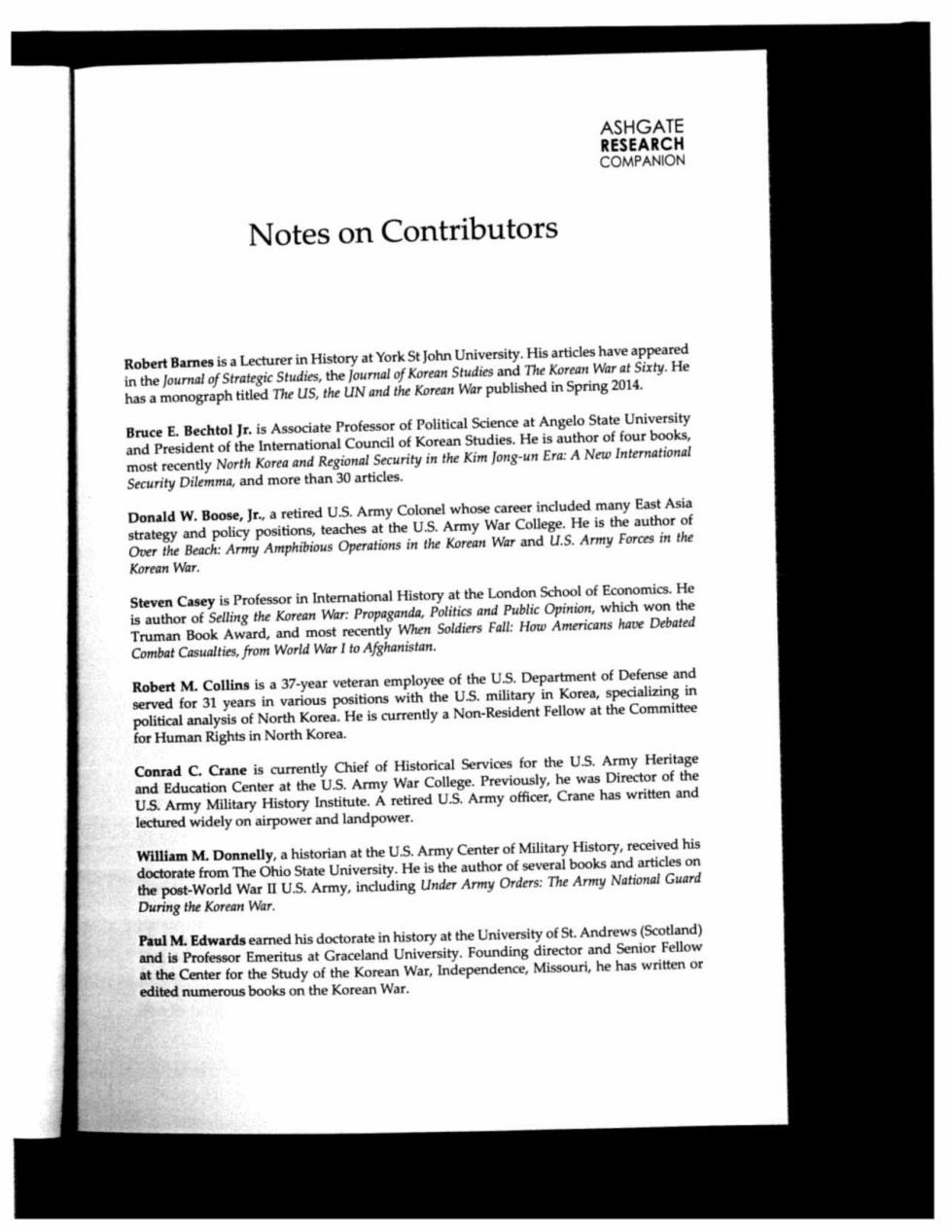
ASHGATE RESEARCH COMPANION Notes on Contributors Robert Bares is a Lecturer in History at York St John University.His articles have appeared in the Journal of Strategic Studies,the Journal of Korean Studies and The Korean War at Sixty.He has a monograph titled The US,the UN and the Korean War published in Spring 2014. Bruce E.Bechtol Jr.is Associate Professor of Political Science at Angelo State University and President of the International Council of Korean Studies.He is author of four books, most recently North Korea and Regional Security in the Kim Jong-un Era:A New International Security Dilemma,and more than 30 articles. Donald W.Boose,Jr.,a retired U.S.Army Colonel whose career included many East Asia strategy and policy positions,teaches at the U.S.Army War College.He is the author of Over the Beach:Army Amphibious Operations in the Korean War and U.S.Army Forces in the Korean War. Steven Casey is Professor in International History at the London School of Economics.He is author of Selling the Korean War:Propaganda,Politics and Public Opinion,which won the Truman Book Award,and most recently When Soldiers Fall:How Americans have Debated Combat Casualties,from World War I to Afghanistan. Robert M.Collins is a 37-year veteran employee of the U.S.Department of Defense and served for 31 years in various positions with the U.S.military in Korea,specializing in political analysis of North Korea.He is currently a Non-Resident Fellow at the Committee for Human Rights in North Korea. Conrad C.Crane is currently Chief of Historical Services for the U.S.Army Heritage and Education Center at the U.S.Army War College.Previously,he was Director of the U.S.Army Military History Institute.A retired U.S.Army officer,Crane has written and lectured widely on airpower and landpower. William M.Donnelly,a historian at the U.S.Army Center of Military History,received his doctorate from The Ohio State University.He is the author of several books and articles on the post-World War II U.S.Army,including Under Army Orders:The Army National Guard During the Korean War. Paul M.Edwards eamned his doctorate in history at the University of St.Andrews(Scotland) and is Professor Emeritus at Graceland University.Founding director and Senior Fellow at the Center for the Study of the Korean War,Independence,Missouri,he has written or edited numerous books on the Korean War
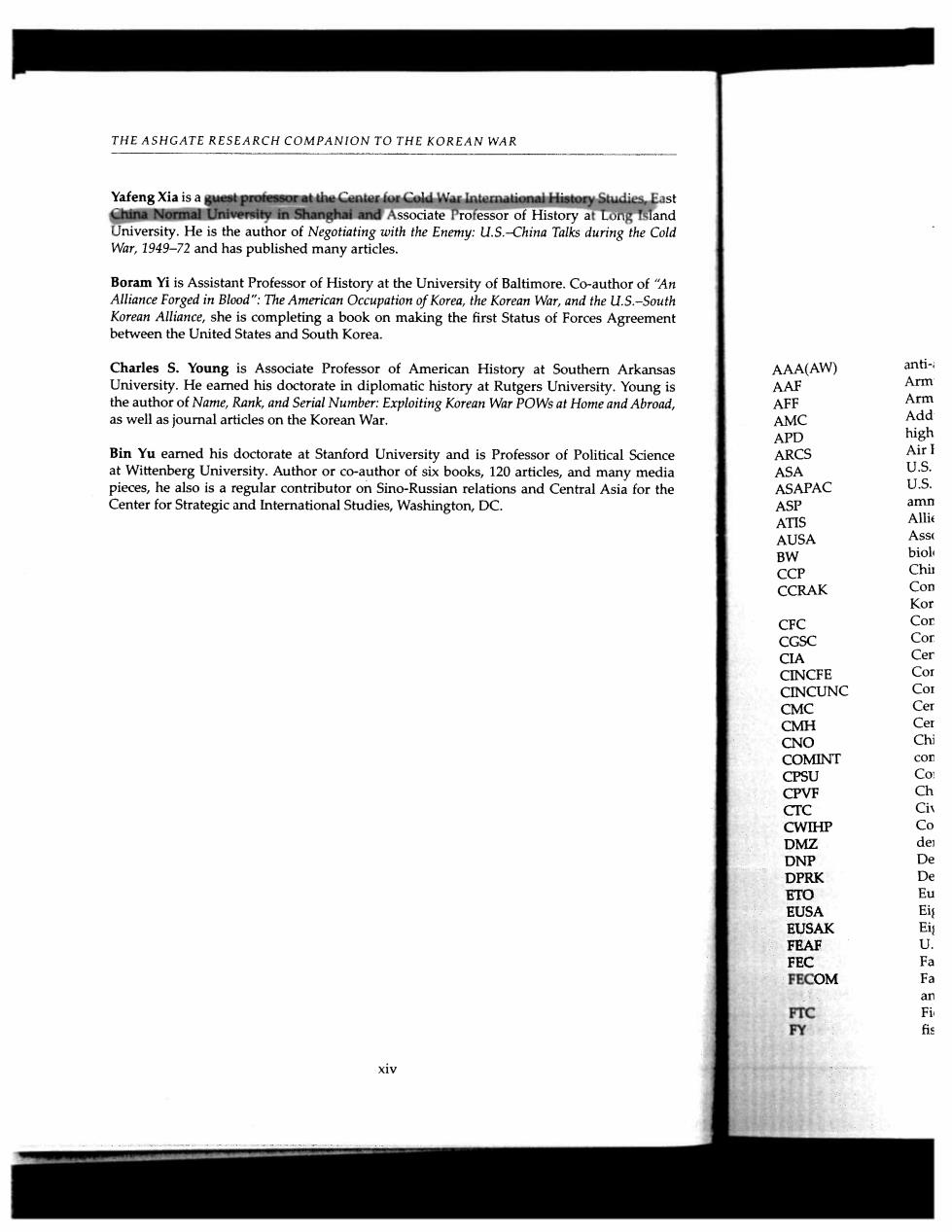
THE ASHGATE RESEARCH COMPANION TO THE KOREAN WAR Yafeng Xia is a guest professor at the Center for Cold War International History Studies,East China Normal University in Shanghai and Associate Professor of History at Long Island University.He is the author of Negotiating with the Enemy:U.S.-China Talks during the Cold War,1949-72 and has published many articles. Boram Yi is Assistant Professor of History at the University of Baltimore.Co-author of"An Alliance Forged in Blood":The American Occupation of Korea,the Korean War,and the U.S.-South Korean Alliance,she is completing a book on making the first Status of Forces Agreement between the United States and South Korea. Charles S.Young is Associate Professor of American History at Southern Arkansas AAA(AW) anti- University.He earned his doctorate in diplomatic history at Rutgers University.Young is AAF Arm the author of Name,Rank,and Serial Number:Exploiting Korean War POWs at Home and Abroad, AFF Arm as well as journal articles on the Korean War. AMC Add APD high Bin Yu earned his doctorate at Stanford University and is Professor of Political Science ARCS Air at Wittenberg University.Author or co-author of six books,120 articles,and many media ASA U.S. pieces,he also is a regular contributor on Sino-Russian relations and Central Asia for the ASAPAC U.S. Center for Strategic and International Studies,Washington,DC. ASP amn ATIS Allie AUSA Asso BW biole CCP Chir CCRAK Con Kor CFC Cor CGSC Cor CIA Cer CINCFE C CINCUNC CMC &ar CMH Ce CNO hi COMINT con CPSU Co: CPVF CTC CWIHP 559 DMZ DNP DPRK e ETO EUSA Eig EUSAK E FEAF U. FEC FECOM TC i FY fis xiv
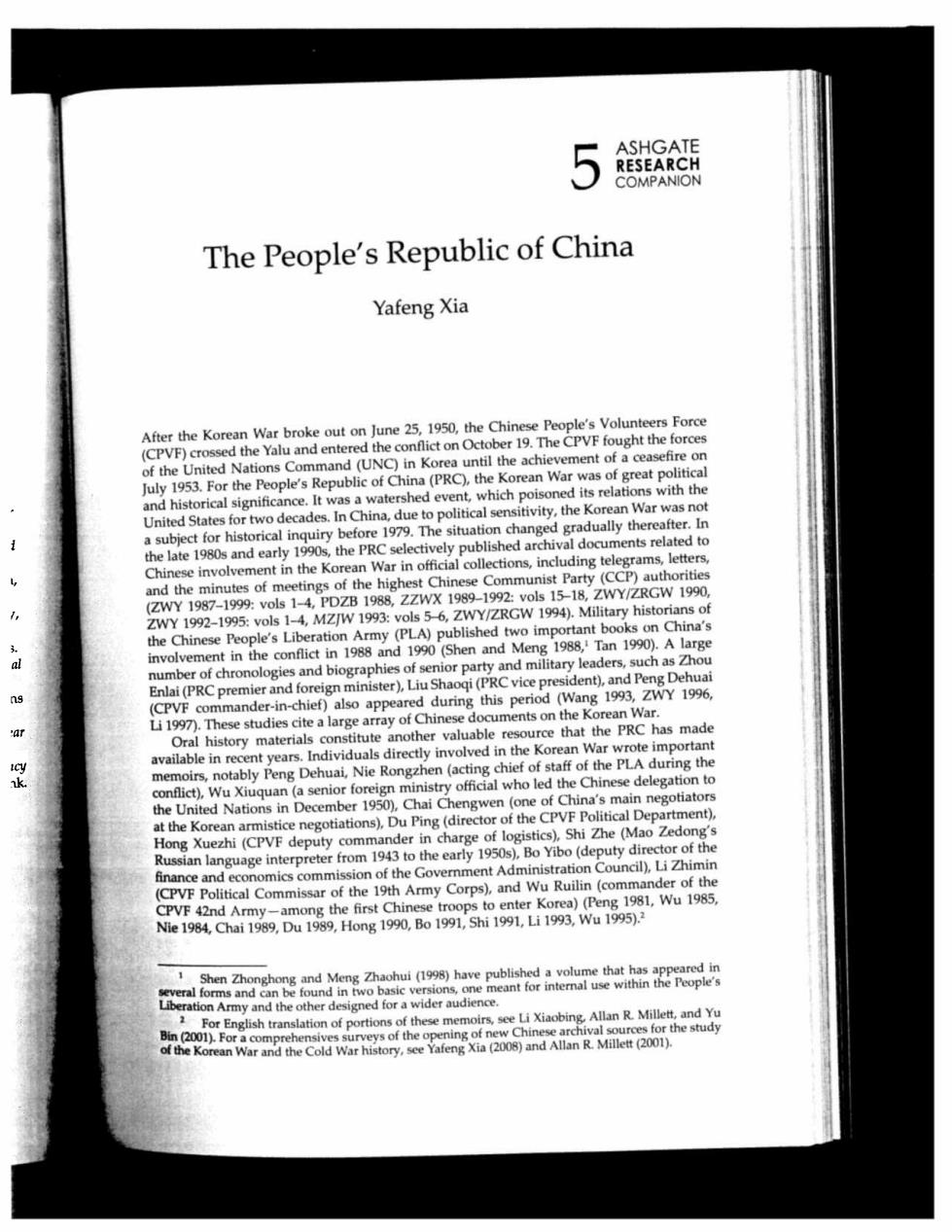
5 ASHGATE RESEARCH COMPANION The People's Republic of China Yafeng Xia After the Korean War broke out on June 25,1950,the Chinese People's Volunteers Force (CPVF)crossed the Yalu and entered the conflict on October 19.The CPVF fought the forces of the United Nations Command(UNC)in Korea until the achievement of a ceasefire on July 1953.For the People's Republic of China(PRC),the Korean War was of great political and historical significance.It was a watershed event,which poisoned its relations with the United States for two decades.In China,due to political sensitivity,the Korean War was not a subject for historical inquiry before 1979.The situation changed gradually thereafter.In the late 1980s and early 1990s,the PRC selectively published archival documents related to Chinese involvement in the Korean War in official collections,including telegrams,letters, and the minutes of meetings of the highest Chinese Communist Party(CCP)authorities (☑WY1987-1999:vols1-4,PDZB1988,ZZWX1989-1992:vols15-18,ZWY/ZRGW1990, ZWY 1992-1995:vols 1-4,MZ/W 1993:vols 5-6,ZWY/ZRGW 1994).Military historians of the Chinese People's Liberation Army(PLA)published two important books on China's involvement in the conflict in 1988 and 1990 (Shen and Meng 1988,'Tan 1990).A large al number of chronologies and biographies of senior party and military leaders,such as Zhou Enlai(PRC premier and foreign minister),Liu Shaoqi(PRC vice president),and Peng Dehuai ns (CPVF commander-in-chief)also appeared during this period (Wang 1993,ZWY 1996, Li 1997).These studies cite a large array of Chinese documents on the Korean War. Oral history materials constitute another valuable resource that the PRC has made available in recent years.Individuals directly involved in the Korean War wrote important icy k memoirs,notably Peng Dehuai,Nie Rongzhen (acting chief of staff of the PLA during the conflict),Wu Xiuquan(a senior foreign ministry official who led the Chinese delegation to the United Nations in December 1950),Chai Chengwen (one of China's main negotiators at the Korean armistice negotiations),Du Ping(director of the CPVF Political Department), Hong Xuezhi(CPVF deputy commander in charge of logistics),Shi Zhe (Mao Zedong's Russian language interpreter from 1943 to the early 1950s).Bo Yibo(deputy director of the finance and economics commission of the Government Administration Council),Li Zhimin (CPVF Political Commissar of the 19th Army Corps),and Wu Ruilin(commander of the CPVE 42nd Army-among the first Chinese troops to enter Korea)(Peng 1981,Wu 1985, Nie1984,Chai1989,Du1989,Hong1990,Bo1991,Shi1991,i1993,Wu1995).2 Shen Zhonghong and Meng Zhaohui (1998)have published a volume that has appeared in several forms and can be found in two basic versions,one meant for internal use within the People's Liberation Army and the other designed for a wider audience. For English translation of portions of these memoirsLi Xiaobing Allan R Millett,and Yu Bin (2001).Fora comprehensives surveys of the opening of new Chinese archival sources for the study of the Korean War and the Cold War history,see Yafeng Xia (2008)and Allan R.Millett(2001)
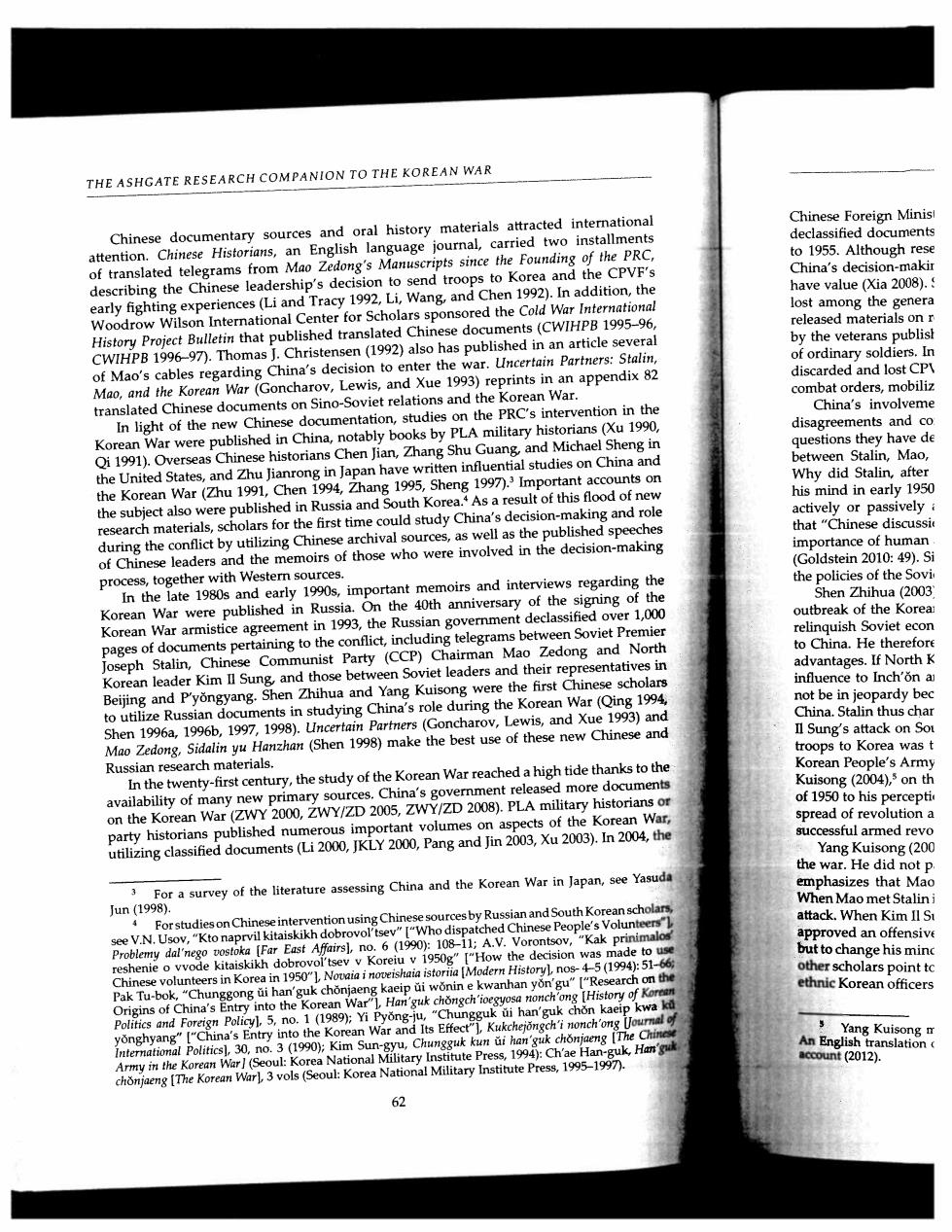
THE ASHGATE RESEARCH COMPANION TO THE KOREAN WAR Chinese documentary sources and oral history materials attracted international Chinese Foreign Minis! attention.Chinese Historians,an English language journal,carried two installments declassified documents of translated telegrams from Mao Zedong's Manuscripts since the Founding of the PRC, to 1955.Although rese describing the Chinese leadership's decision to send troops to Korea and the CPVF's China's decision-makir early fighting experiences(Li and Tracy 1992,Li,Wang,and Chen 1992).In addition,the have value (Xia 2008). Woodrow Wilson International Center for Scholars sponsored the Cold War International lost among the genera History Project Bulletin that published translated Chinese documents(CWIHPB 1995-96, released materials on r CWIHPB 1996-97).Thomas J.Christensen(1992)also has published in an article several by the veterans publish of Mao's cables regarding China's decision to enter the war.Uncertain Partners:Stalin, of ordinary soldiers.In Mao,and the Korean War(Goncharov,Lewis,and Xue 1993)reprints in an appendix 82 discarded and lost CP\ translated Chinese documents on Sino-Soviet relations and the Korean War. combat orders,mobiliz In light of the new Chinese documentation,studies on the PRC's intervention in the China's involveme Korean War were published in China,notably books by PLA military historians(Xu 1990, disagreements and co Qi 1991).Overseas Chinese historians Chen Jian,Zhang Shu Guang,and Michael Sheng in questions they have de the United States,and Zhu Jianrong in Japan have written influential studies on China and between Stalin,Mao, the Korean War(Zhu 1991,Chen 1994,Zhang 1995,Sheng 1997).3 Important accounts on Why did Stalin,after the subject also were published in Russia and South Korea.As a result of this flood of new his mind in early 1950 research materials,scholars for the first time could study China's decision-making and role actively or passively a during the conflict by utilizing Chinese archival sources,as well as the published speeches that "Chinese discussie of Chinese leaders and the memoirs of those who were involved in the decision-making importance of human (Goldstein 2010:49).Si process,together with Western sources. In the late 1980s and early 1990s,important memoirs and interviews regarding the the policies of the Sovi Korean War were published in Russia.On the 40th anniversary of the signing of the Shen Zhihua (2003 Korean War armistice agreement in 1993,the Russian government declassified over 1,000 outbreak of the Korea pages of documents pertaining to the conflict,including telegrams between Soviet Premier relinquish Soviet econ Joseph Stalin,Chinese Communist Party (CCP)Chairman Mao Zedong and North to China.He therefore Korean leader Kim II Sung,and those between Soviet leaders and their representatives in advantages.If North K Beijing and P'yongyang.Shen Zhihua and Yang Kuisong were the first Chinese scholars influence to Inch'on a to utilize Russian documents in studying China's role during the Korean War(Qing 1994, not be in jeopardy bec Shen 1996a,1996b,1997,1998).Uncertain Partners(Goncharov,Lewis,and Xue 1993)and China.Stalin thus char Mao Zedong,Sidalin yu Hanzhan(Shen 1998)make the best use of these new Chinese and ⅡSung's attack on Sou troops to Korea was t Russian research materials. In the twenty-first century,the study of the Korean War reached a high tide thanks to the Korean People's Army availability of many new primary sources.China's government released more documents Kuisong (2004),s on th on the Korean War(ZWY 2000,ZWY/ZD 2005,ZWY/ZD 2008).PLA military historians or of 1950 to his percepti party historians published numerous important volumes on aspects of the Korean War, spread of revolution a utilizing classified documents (Li 2000,JKLY 2000,Pang and Jin 2003,Xu 2003).In 2004,the successful armed revo Yang Kuisong(200 the war.He did not p 3 For a survey of the literature assessing China and the Korean War in Japan,see Yasuda emphasizes that Mao When Mao met Stalin i For studies on Chinese intervention using Chinese sources by Russian and South Korean scholars, Jun(1998). attack.When Kim Il S see V.N.Usov,"Kto naprvil kitaiskikh dobrovol'tsev"["Who dispatched Chinese People's Volunteers" Problemy dal'nego vostoka [Far East Affairs],no.6(1990):108-11;A.V.Vorontsov,"Kak prinimalos approved an offensive reshenie o vvode kitaiskikh dobrovol'tsev v Koreiu v 1950g"["How the decision was made to use but to change his minc Chinese volunteers in Korea in 1950"1Novaia inoveishaia istoriia[Modern Historyl,nos-4-5(1994):51-6 other scholars point tc Pak Tu-bok,"Chunggong ui han'guk chonjaeng kaeip ui wonin e kwanhan yon'gu"["Research on the ethnic Korean officers Origins of China's Entry into the Korean War"Han'guk chongch'ioegyosa nonch'ong [History of Kore Politics and Foreign Policyl.5,no.1 (1989);Yi Pyong-ju,"Chungguk ui han'guk chon kaeip kwa k yonghyang"["China's Entry into the Korean War and Its Effect"]Kukchejongch'i nonch'ong Uoural International Politics],30,no.3(1990):Kim Sun-gyu,Chungguk kuni han'guk chonjaeng [The Chinese 》Yang Kuisong An English translation c Army in the Korean War](Seoul:Korea National Military Institute Press,1994):Ch'ae Han-guk,Han'guk account(2012). chonjaeng [The Korean Warl,3 vols(Seoul:Korea National Military Institute Press,1995-1997). 62

THE PEOPLE'S REPUBLIC OF CHINA Chinese Foreign Ministry began making some of its holdings available-the first batch of declassified documents comprised diplomatic files generated during the period from 1949 to 1955.Although researchers have not been able to discover any documents related to China's decision-making during the Korean War,those that deal with the armistice talks have value (Xia 2008).Some scholars have discovered Korean War related documents long lost among the general public.Beijing,Shanghai,and Jilin municipal archives also have released materials on regional efforts in supporting China's war execution.Some memoirs by the veterans published during this period are useful for studying the activities and life of ordinary soldiers.In particular,the Republic of Korea(ROK)published four volumes of discarded and lost CPVF documents of significant historical value,including among others combat orders,mobilization speeches,and letters soldiers wrote home (IACS 2000). China's involvement in the Korean War has long been the focus of interpretive disagreements and controversies among scholars studying the conflict.The first set of questions they have debated relates to the origins of the war,in particular the relationship between Stalin,Mao,and Kim Il Sung before North Korea's attack on June 25,1950. Why did Stalin,after long resisting Kim Il Sung's requests to invade,suddenly change his mind in early 1950?What exactly did Mao know about Kim's plan?Did PRC leaders actively or passively agree to support North Korea's invasion?Steven Goldstein notes that"Chinese discussions of the origins of the war have gradually come to emphasize the importance of human agency,while treating the international environment as contextual" (Goldstein 2010:49).Since the 1990s,Chinese scholars have traced the origins of the war to the policies of the Soviet Union and the Democratic People's Republic of Korea(DPRK). Shen Zhihua(2003)discusses the relationship between the Sino-Soviet alliance and the outbreak of the Korean War.Dictating Stalin's behavior,he argues,was his agreement to relinquish Soviet economic privileges in Northeast China and return Dalian and Lushun to China.He therefore calculated that a war on the Korea peninsula could restore Soviet advantages.If North Korea conquered South Korea,then the Soviet Union could extend its influence to Inch'on and Pusan.Even if North Korea lost the war,Soviet interests would not be in jeopardy because the Chinese would have to ask the Soviets to stay in Northeast China.Stalin thus changed his policy in Korea from defensive to offensive,authorizing Kim Il Sung's attack on South Korea.Shen suggests that the main reason Mao decided to send troops to Korea was to avert Soviet entry to Northeast China after the U.S.defeat of the Korean People's Army(KPA)and probable extension of the fighting into Manchuria.Yang Kuisong(2004),5 on the other hand,attributes Stalin's decisive policy change in the spring of 1950 to his perception of a shift in the balance of power in Asia that was favorable to the spread of revolution and to confronting U.S.power.The CCP victory provided a model of successful armed revolution,Yang argues,that persuaded Stalin to launch the Korean War. Yang Kuisong(2003)argues that Mao's involvement in North Korea was limited before the war.He did not participate in Soviet and DPRK planning for the attack.Kim Donggil emphasizes that Mao consistently opposed a North Korean invasion throughout 1949. When Mao met Stalin in Moscow in early 1950,he followed a strategy of trying to prevent an attack.When Kim II Sung arrived in Beijing in mid May 1950 to inform Mao that Stalin had approved an offensive to achieve unification pending Mao's approval,Mao had no choice but to change his mind,in part because the decision already had been made(Kim 2006).But other scholars point to China's repatriation to North Korea in 1949 and 1950 of about 37,000 ethnic Korean officers and soldiers in the PLA as evidence that the CCP actually supported 5 Yang Kuisong makes these arguments in his critical review of Shen Zhihua's study (2003). An English translation of it appears as the introduction for the English language version of Shen's account (2012). 63
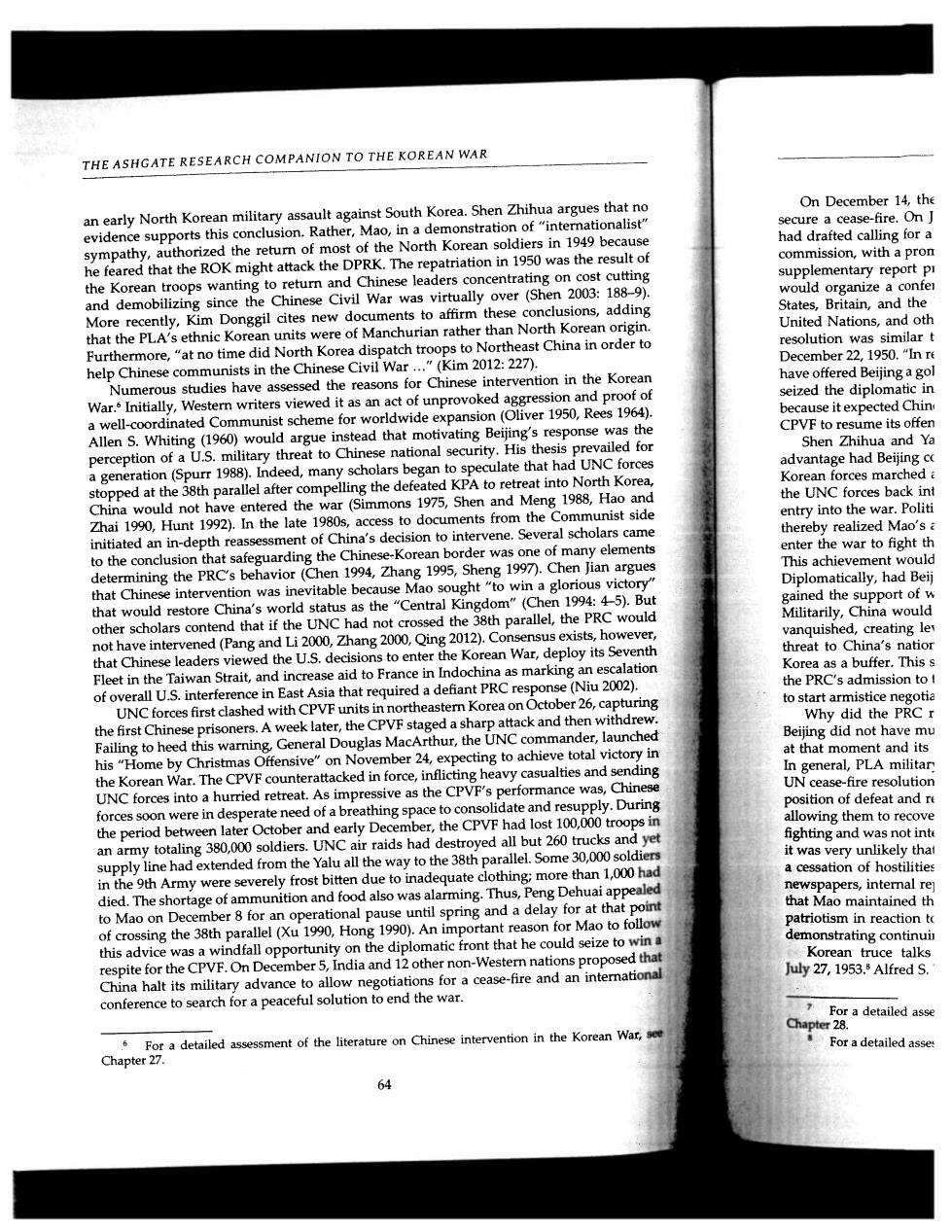
THE ASHGATE RESEARCH COMPANION TO THE KOREAN WAR an early North Korean military assault against South Korea.Shen Zhihua argues that no On December 14,the evidence supports this conclusion.Rather,Mao,in a demonstration of"internationalist" secure a cease-fire.On J sympathy,authorized the return of most of the North Korean soldiers in 1949 because had drafted calling for a he feared that the ROK might attack the DPRK.The repatriation in 1950 was the result of commission,with a prom the Korean troops wanting to return and Chinese leaders concentrating on cost cutting supplementary report pi and demobilizing since the Chinese Civil War was virtually over(Shen 2003:188-9). would organize a confei More recently,Kim Donggil cites new documents to affirm these conclusions,adding States,Britain,and the that the PLA's ethnic Korean units were of Manchurian rather than North Korean origin. United Nations,and oth Furthermore,"at no time did North Korea dispatch troops to Northeast China in order to resolution was similar t help Chinese communists in the Chinese Civil War..."(Kim 2012:227). December 22,1950."In re Numerous studies have assessed the reasons for Chinese intervention in the Korean have offered Beijing a gol War.Initially,Western writers viewed it as an act of unprovoked aggression and proof of seized the diplomatic in a well-coordinated Communist scheme for worldwide expansion(Oliver 1950,Rees 1964). because it expected Chin Allen S.Whiting(1960)would argue instead that motivating Beijing's response was the CPVF to resume its offen perception of a U.S.military threat to Chinese national security.His thesis prevailed for Shen 2☑hihua and Ya a generation(Spurr 1988).Indeed,many scholars began to speculate that had UNC forces advantage had Beijing cc stopped at the 38th parallel after compelling the defeated KPA to retreat into North Korea, Korean forces marched a China would not have entered the war(Simmons 1975,Shen and Meng 1988,Hao and the UNC forces back int Zhai 1990,Hunt 1992).In the late 1980s,access to documents from the Communist side entry into the war.Politi initiated an in-depth reassessment of China's decision to intervene.Several scholars came thereby realized Mao's a to the conclusion that safeguarding the Chinese-Korean border was one of many elements enter the war to fight th determining the PRC's behavior (Chen 1994,Zhang 1995,Sheng 1997).Chen Jian argues This achievement would that Chinese intervention was inevitable because Mao sought"to win a glorious victory" Diplomatically,had Beij that would restore China's world status as the "Central Kingdom"(Chen 1994:4-5).But gained the support of w other scholars contend that if the UNC had not crossed the 38th parallel,the PRC would Militarily,China would not have intervened(Pang and Li 2000,Zhang 2000,Qing 2012).Consensus exists,however, vanquished,creating ley that Chinese leaders viewed the U.S.decisions to enter the Korean War,deploy its Seventh threat to China's natior Fleet in the Taiwan Strait,and increase aid to France in Indochina as marking an escalation Korea as a buffer.This s of overall U.S.interference in East Asia that required a defiant PRC response(Niu 2002). the PRC's admission to I UNC forces first clashed with CPVF units in northeastern Korea on October 26,capturing to start armistice negotia the first Chinese prisoners.A week later,the CPVF staged a sharp attack and then withdrew. Why did the PRC r Failing to heed this warning,General Douglas MacArthur,the UNC commander,launched Beijing did not have mu his"Home by Christmas Offensive"on November 24,expecting to achieve total victory in at that moment and its the Korean War.The CPVF counterattacked in force,inflicting heavy casualties and sending In general,PLA militar UNC forces into a hurried retreat.As impressive as the CPVF's performance was,Chinese UN cease-fire resolution forces soon were in desperate need of a breathing space to consolidate and resupply.During position of defeat and re the period between later October and early December,the CPVF had lost 100,000 troops in allowing them to recove an army totaling 380,000 soldiers.UNC air raids had destroyed all but 260 trucks and yet fighting and was not inte supply line had extended from the Yalu all the way to the 38th parallel.Some 30,000 soldiers it was very unlikely that in the 9th Army were severely frost bitten due to inadequate clothing;more than 1,000 had a cessation of hostilities died.The shortage of ammunition and food also was alarming.Thus,Peng Dehuai appealed newspapers,internal re to Mao on December 8 for an operational pause until spring and a delay for at that point that Mao maintained th of crossing the 38th parallel(Xu 1990,Hong 1990).An important reason for Mao to follow patriotism in reaction to this advice was a windfall opportunity on the diplomatic front that he could seize to win a demonstrating continuin respite for the CPVF.On December 5,India and 12 other non-Western nations proposed that Korean truce talks China halt its military advance to allow negotiations for a cease-fire and an international July 27,1953.Alfred S. conference to search for a peaceful solution to end the war. For a detailed asse Chapter28. 6 For a detailed assessment of the literature on Chinese intervention in the Korean War,see For a detailed asses Chapter 27. 64
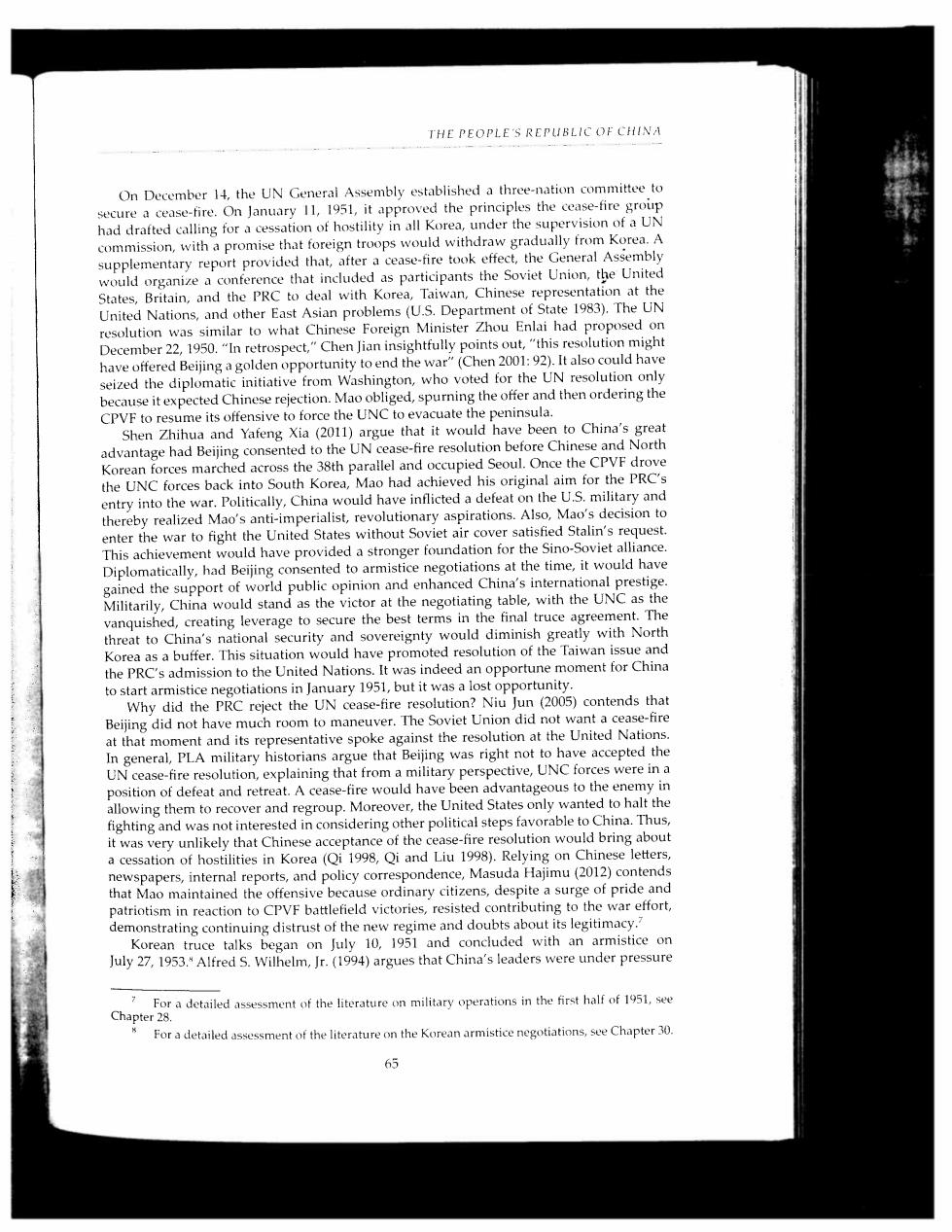
THE PEOPLE'S REPUBLIC OF CHINA On December 14,the UN General Assembly established a three-nation committee to secure a cease-fire.On January 11,1951,it approved the principles the cease-fire group had drafted calling for a cessation of hostility in all Korea,under the supervision of a UN commission,with a promise that foreign troops would withdraw gradually from Korea.A supplementary report provided that,after a cease-fire took effect,the General Assembly would organize a conference that included as participants the Soviet Union,the United States,Britain,and the PRC to deal with Korea,Taiwan,Chinese representation at the United Nations,and other East Asian problems(U.S.Department of State 1983).The UN resolution was similar to what Chinese Foreign Minister Zhou Enlai had proposed on December 22,1950."In retrospect,"Chen Jian insightfully points out,"this resolution might have offered Beijing a golden opportunity to end the war"(Chen 2001:92).It also could have seized the diplomatic initiative from Washington,who voted for the UN resolution only because it expected Chinese rejection.Mao obliged,spurning the offer and then ordering the CPVF to resume its offensive to force the UNC to evacuate the peninsula. Shen Zhihua and Yafeng Xia(2011)argue that it would have been to China's great advantage had Beijing consented to the UN cease-fire resolution before Chinese and North Korean forces marched across the 38th parallel and occupied Seoul.Once the CPVF drove the UNC forces back into South Korea,Mao had achieved his original aim for the PRC's entry into the war.Politically,China would have inflicted a defeat on the U.S.military and thereby realized Mao's anti-imperialist,revolutionary aspirations.Also,Mao's decision to enter the war to fight the United States without Soviet air cover satisfied Stalin's request. This achievement would have provided a stronger foundation for the Sino-Soviet alliance. Diplomatically,had Beijing consented to armistice negotiations at the time,it would have gained the support of world public opinion and enhanced China's international prestige. Militarily,China would stand as the victor at the negotiating table,with the UNC as the vanquished,creating leverage to secure the best terms in the final truce agreement.The threat to China's national security and sovereignty would diminish greatly with North Korea as a buffer.This situation would have promoted resolution of the Taiwan issue and the PRC's admission to the United Nations.It was indeed an opportune moment for China to start armistice negotiations in January 1951,but it was a lost opportunity Why did the PRC reject the UN cease-fire resolution?Niu Jun(2005)contends that Beijing did not have much room to maneuver.The Soviet Union did not want a cease-fire at that moment and its representative spoke against the resolution at the United Nations. In general,PLA military historians argue that Beijing was right not to have accepted the UN cease-fire resolution,explaining that from a military perspective,UNC forces were in a position of defeat and retreat.A cease-fire would have been advantageous to the enemy in allowing them to recover and regroup.Moreover,the United States only wanted to halt the fighting and was not interested in considering other political steps favorable to China.Thus, it was very unlikely that Chinese acceptance of the cease-fire resolution would bring about a cessation of hostilities in Korea(Qi 1998,Qi and Liu 1998).Relying on Chinese letters, newspapers,internal reports,and policy correspondence,Masuda Hajimu(2012)contends that Mao maintained the offensive because ordinary citizens,despite a surge of pride and patriotism in reaction to CPVF battlefield victories,resisted contributing to the war effort, demonstrating continuing distrust of the new regime and doubts about its legitimacy.? Korean truce talks began on July 10,1951 and concluded with an armistice on July 27,1953."Alfred S.Wilhelm,Jr.(1994)argues that China's leaders were under pressure For a detailed assessment of the literature on military operations in the first half of 1951,see Chapter 28. For a detailed assessment of the literature on the Korean armistice negotiations,see Chapter 30. 65